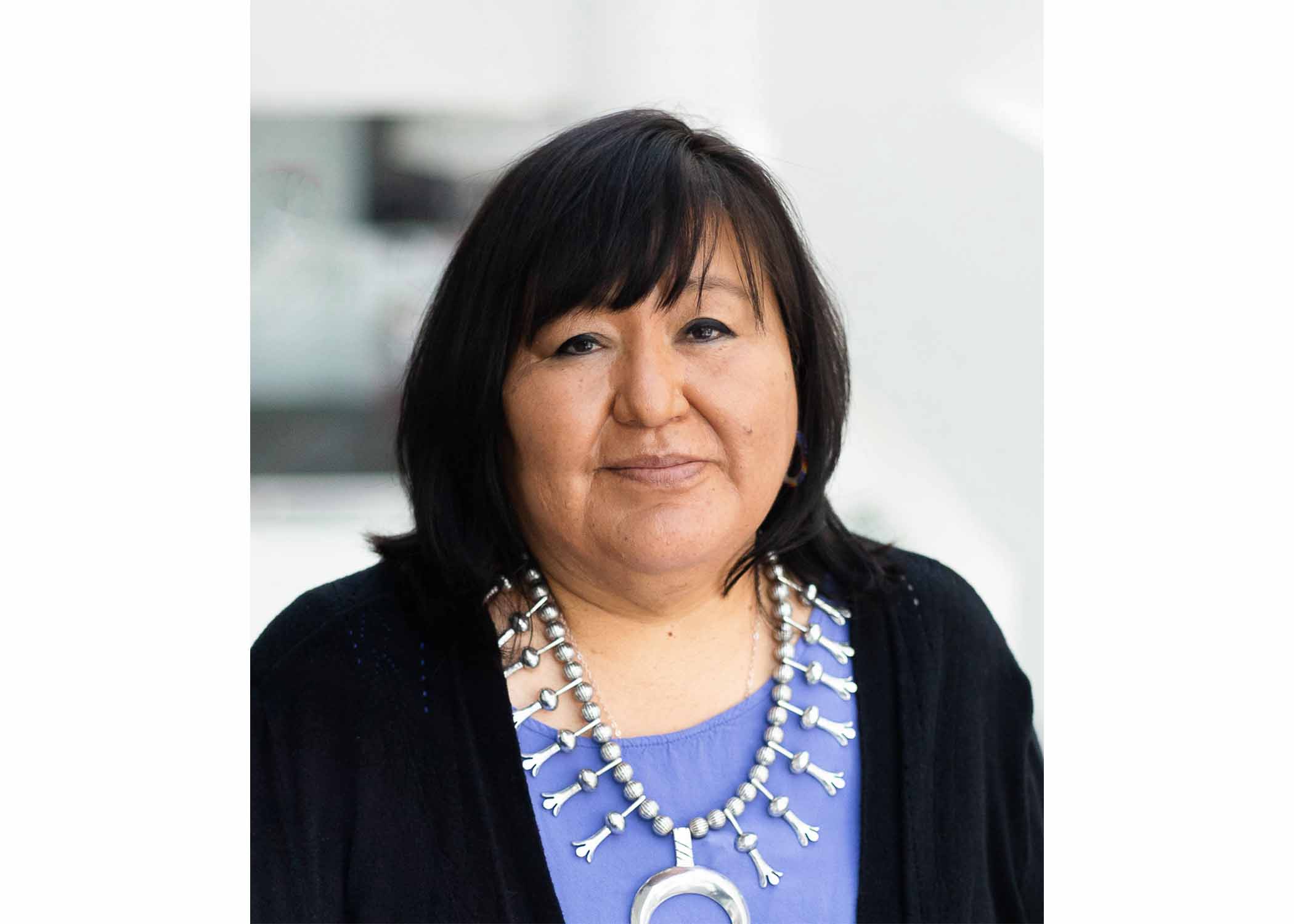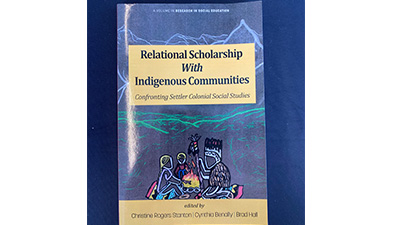Faculty Feature: Dr. Cynthia Benally

About Dr. Cynthia Benally
Natoh Dine’é Tachiinii nishłí. I am a Diné woman. As a baby, when my umbilical cord fell off, my parents buried it in Naadą́ą́’ Díílid (a valley outside of Piñon, Arizona). I am physically connected to that land and community. Although this is “home”, I did not grow up there. Due to settler colonial laws and policies, I attended schools in majority white middle-class areas. Although prior to entering formal schooling, I was fortunate to learn my ancestral language as my first language and practicing Dine’ ways of knowing and being from birth to childhood. I now continue to (re)learn those ways of being.
Dr. Benally is an assistant professor of Native American Education in the Department of Education, Culture and Society in the College of Education. She guest edited a 2019 special issue in the Journal of American Indian Education, “Indigenizing the Curriculum: Putting the “Native” into Native American Content Instruction Mandates.” This issue highlighted the educational state mandates that require Native content instruction. She recently co-edited a book with Christine Stanton, Professor at Montana State University, and Brad Hall, President of Blackfeet Community College titled Relational Scholarship With Indigenous Communities: Confronting Settler Colonial Social Studies, it is about the ways Non-Native educators can work with Native communities in a social studies context.

Below are Dr. Benally's responses to my written questions about her current work, experience working with EH students, and what she hopes to do as an EH faculty affiliate.
- Your research focuses on critical Indigenous Research Methodologies, Indigenous Epistemologies, and anti-colonial studies. Can you share how these frameworks guide your current work and what you are focusing on professionally right now?
My own schooling experience is what has led me to focus on these areas. I saw how schooling was detrimental to the little girl I once was. Education on Native topics and issues has been healing for me. I have come to realize that many of us, Native and non-Native, have experienced traumas as a part of the schooling system. My work in anti-colonial education centers around my belief that schooling may have damaged many of us, but I also believe education can heal us. Schooling and education are very different.
This is where Indigenous epistemologies come in. I teach about Indigenous epistemology not to say these are better ways of knowing but to present them from an anthropological perspective: “Making the strange familiar and the familiar strange.” For example, I began this interview by telling you what my parents did for me to become Diné (Diné translates to person/human). That connection to the earth, creating that relationship, is the first lesson or step to becoming human. I ask students: what lessons did you learn on how to become human?
To me, Indigenous research methodologies is a combination of anti-colonial education and Indigenous epistemologies. There are different ways research can been done. One such way is rooted in Native ways of knowing or epistemologies. They are relationality, reciprocity, respect, responsibility, relevance, and reflexivity. Indigenous Research Methodologies, Indigenous Epistemologies, and anti-colonial education are important to creating and sustaining relationships, be it for “research”, teaching, or working with Native Nations and communities. I believe there are many people out there that want to engage with Native Nations and communities but are afraid of making mistakes or do not know where to begin. I hope the work I do assists with fostering respectful relationships.
- You have worked with Environmental Humanities graduate students like Hannah Taub ('22) and Fiona Summers ('23). What has your experience been like mentoring students in the Environmental Humanities, and how do these collaborations impact your own research?
Wow! When I first met Hannah, I was in the process of envisioning the Working with Native Communities certificate program. I imagined that the courses she took with me would eventually be part of the program. It was a fortunate opportunity, as she was able to "pilot" the certificate program. What she accomplished in partnership with the Northwestern Band of the Shoshone Nation in such a short time provided the evidence I needed to know I was on the right track. When Hannah graduated, Fiona stepped in and continued the work with the Northwestern Band of the Shoshone Nation.
I have had the opportunity to mentor multiple EH students beyond Hannah and Fiona. These students often come to my courses with more knowledge of Native Nations, peoples, and cultural understandings than the typical student. I find that they are aware of diversity and social issues, and with that understanding, they tend to have an open mindset to different ays folks learn and know. With both Hannah and Fiona, they recognized that what they initially thought or had in mind did not always align with the goals of the Native Nation. They were humble and patient enough to let the Nation guide them in their work
- As a new faculty affiliate with the Environmental Humanities Program, what are you most looking forward to in terms of collaboration and contributing to the program’s interdisciplinary approach?
I am very interested in relationships and kinship. I research how settler educational policies and curricula impact relationalities between settler society and Natives peoples, communities, and Nations. When I express my research interests in this way, I believe others assume I am an expert in these topics. In terms of the word "research," it simply means "to study." Due to being uprooted and displaced into primarily white communities, I did/do not fully understand relationships. As a result, I study the relationships and relationality between white and Native communities as they are manifested or omitted in dominant curricula, educational policies, and laws. What I have learned so far has materialized in the interdisciplinary graduate certificate I created and direct, Working with Native Communities.
With that in mind, I hope to contribute meaningfully to the EH program by bringing different perspectives of ways of knowing and approaches to research. Through collaborations with EH, I also hope we can facilitate projects that Native Nations and communities would like to pursue but may lack the resources or access.
Categories
Featured Posts
Tag Cloud
- community engagement (15)
- student (4)
- nuclear energy (1)
- community practitioner in residence (2)
- practitioner-in-residence (3)
- student spotlight (1)
- Great Salt Lake (1)
- art (1)
- activism (1)
- faculty (4)
- education (1)
- alumni (3)
- environmental literature (1)
- EH research professor (1)
- utah award in the environmental humanities (1)
- indigenous sovereignty (1)
- activist (1)
- downwinder (1)
- staff (1)
- students (2)
- thesis (2)
- project (2)
- exam (1)
- Native research methods (1)
- 1U4U (1)
- graduation (1)
- research (1)
- event (1)
- youth activism (1)
